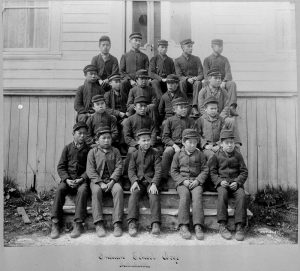When I think about the research that I have done during my time in university, I realize that much of it focuses on Indigenous issues. Whenever I was given the opportunity to choose a topic, I gravitated towards ones about First Nations people. For this course on childhood and education, it seemed a natural choice to write about residential schools. What I did not realize was how difficult it would be. It was difficult not only because of the subject matter but because it was hard to narrow the topic down. The schools ran for over one hundred years, with the last school closing in 1996. Once I thought I had my topic narrowed down, I kept reading. I was looking for sources that would help me answer the questions I had. What I found after reading through a few chapters from several different books was that I would not find many testimonies from Survivors that had good classroom experiences at residential school and also received good grades. The children who were sent or taken to residential school did not speak English when they arrived, which meant that most of their time spent there would be about learning the language and unlearning their first language. I had to find a new approach to this topic and it was becoming clear that the majority of Survivors did poorly at these schools, which was by no means their own fault. They had to learn a new language and endured severe punishment when they made a mistake in class or spoke their Native language in or out of the classroom. Instead of writing about academic success in residential school, I decided to write about the residential school experience and how some Survivors succeeded after residential school.
Category: Research
[Students attending the Metlakatla Indian Residential School, British Columbia, date unknown.]

Reminder From a Survivor
One of the difficult things about doing research is that you often come across great material that doesn’t always make it into the final paper. This is a quote I thought was worth sharing, whether or not it makes it into the research paper:
“As Survivors, we ride waves of vulnerability for a lifetime and for generations. We were subjected to real risk factors including hunger, loneliness, ridicule, physical and sexual abuse, untimely and unseemly death. As we struggle to throw off the shackles of colonization we lean heavily toward healing and resilience becomes our best friend.”[1]
Most people know that residential schools were a horrible, abusive experience for many who attended but it usually seems overlooked that the Survivors and the generations that follow them are resilient. This quote is a reminder of everything that was endured and also that the Survivors pushed forward.
[1] Madeleine Dion Stout, “A Survivor Reflects on Resilience,” in Speaking My Truth: Reflections on Reconciliation and Residential School, (Ottawa: Aboriginal Healing Foundation, 2012), 49-50.
